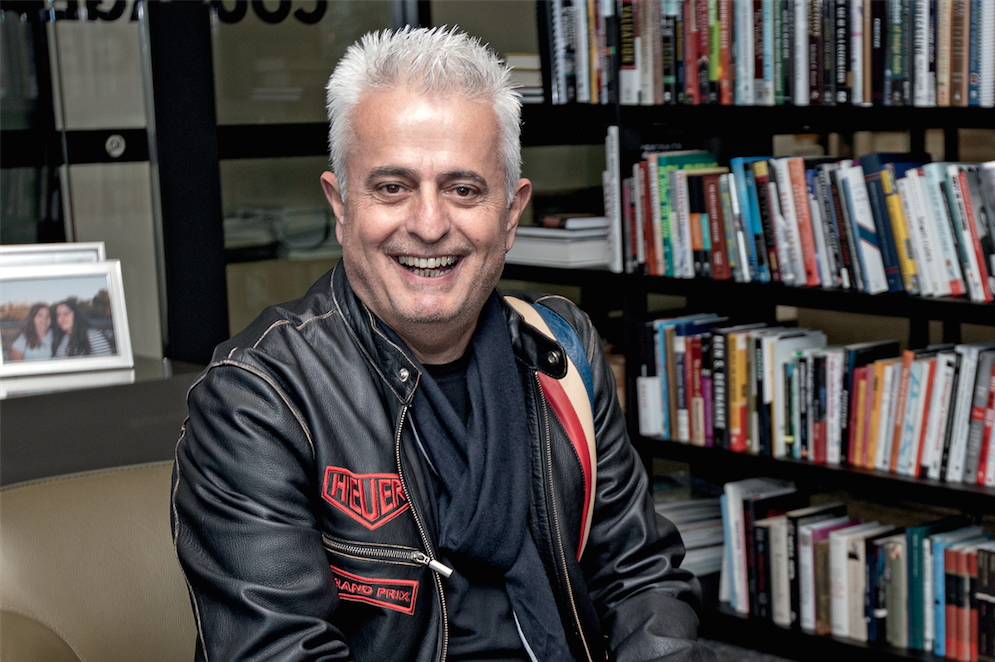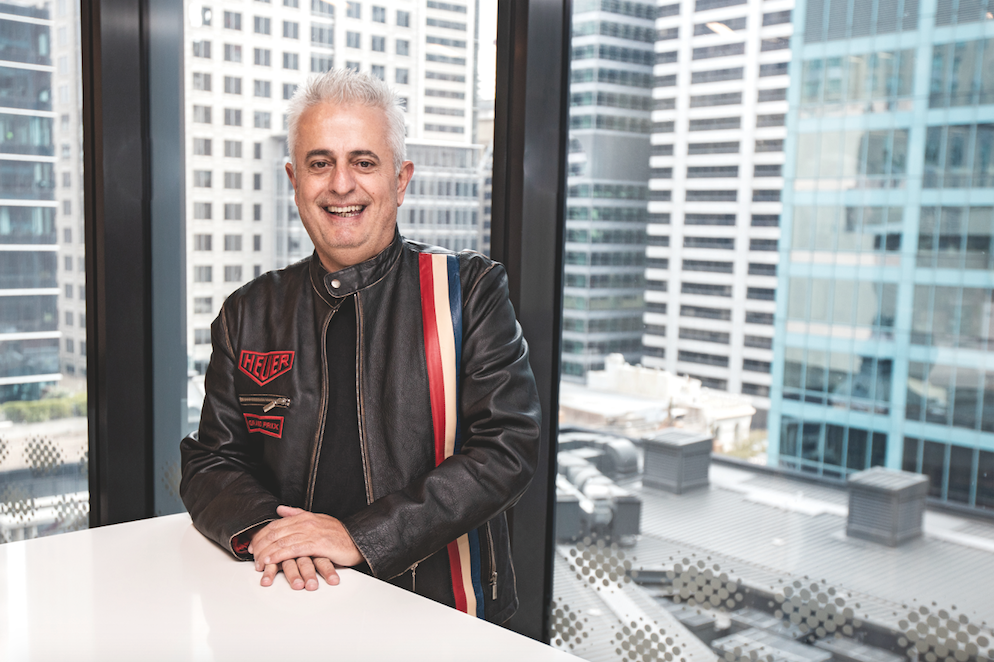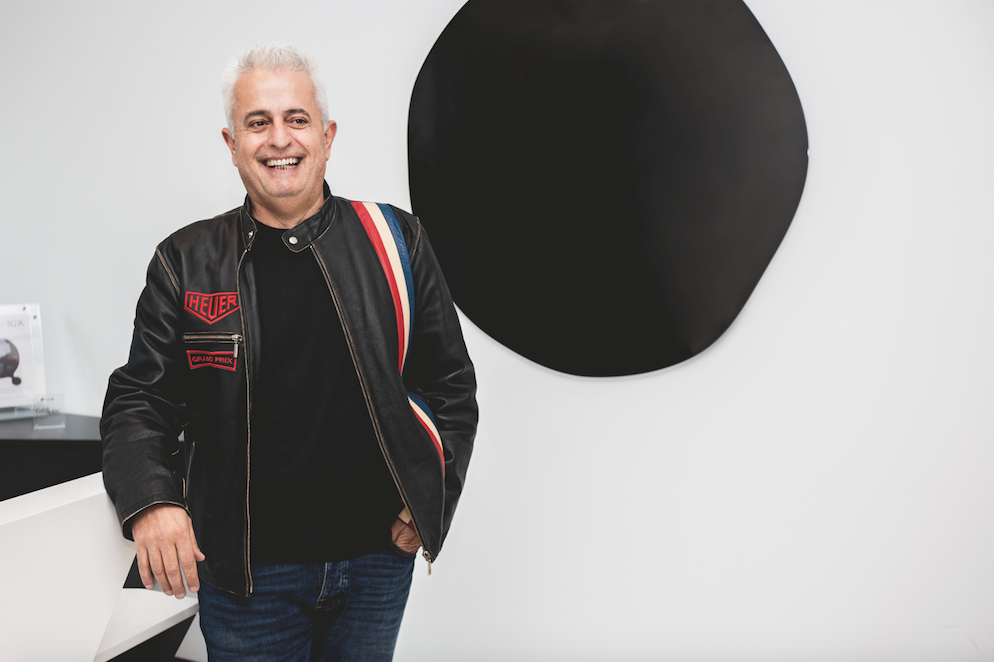Depositing a journalist severely lacking scientific neurons into a room with a nuclear medicine physician is an interesting experiment. One is trained in nuclear medicineradiation immunology and is a fellow of the American College of Nuclear Physicians, the American Academy of Pharmaceutical Physicians, the American College of Nuclear Medicine and the New York Academy of Sciences, who along the way founded The iQ Group Global, which finds, funds and develops bioscience discoveries to create life-changing medical innovations.

The other is your run-of-the-mill journo who can string together a sentence or two, but panics at the mere mention of dosimetry, radiopharmaceuticals and molecular – in fact, any word beginning with ‘bio’.
And there are a lot of them. Hats off to The iQ Group Global CEO Dr George Syrmalis, who, exhibiting the patience of a saint, gently translates the most complex terminology into simplistic language even a child could understand.
Pretty impressive for a nuclear medicine physician turned CEO, heading a company creating the medicines of tomorrow. But then, George is impressive. A quietly spoken, fourth-generation Greek Australian who grew up in Sydney’s inner west, George founded The iQ Group Global to enable the delivery of end-to-end solutions throughout the drug development lifecycle.
Bringing together leading experts, including physicians, scientists, engineers and investment bankers, The iQ Group Global develops early stage bioscience intellectual property with capital resources and scientific expertise to produce innovative therapeutics and diagnostics.
COVID-19 is a healthcare crisis that has financial and social ramifications. It’s not a financial crisis that may have social or healthcare ramifications.
It’s a perfect partnership that contributes to the growth of the global biopharmaceutical industry. Acting as an asset manager, the company finds, funds and develops bioscience discoveries to create life-changing medical innovations. When George says life-changing, he’s talking about mind-boggling futuristic stuff.
Like being able to compare your genetic profile at any stage of life with the DNA you were born with to check for genetic anomalies that could signify the onset of disease.
“These are the innovations we want to create. We are not interested in those marginal innovations. We believe in exponential innovations, and by converging all the technologies we have now such as artificial intelligence, quantum computing, sensors and high-speed wireless networks, we can do it.”
Describing himself as a “very mathematical person who needs to quantify things”, George admits that, while nuclear medicine was a natural choice for him, the constant need to interpret scientific jargon to the layperson is not without conflict.
He often finds himself torn between his scientific brain wanting to respect the intellect of his peers and their decades of research and the marketing instinct he’s had to develop to clarify the language for the masses.
George worries that he’s dumbing down extraordinary data and detail when simplifying it to make it easier for the layperson to understand. But how else do you explain the intricacies of bioscientific studies carried out by the white coats in labs to the suits in the boardroom, or indeed the media? Particularly when there’s billions of dollars of investment at stake.
“Of course, it depends on your audience,” he says. “I may make a simplified scientific statement that will be read by laypeople, and they will love it and they will get it. But when it’s read by my academic colleagues, they’ll tear it apart because they think it’s inaccurate.
“When do you actually degrade science to a level that can be understood by a layperson? Sometimes that is very difficult thing to do. We like to educate people but, believe me, I’ve had some very philosophical debates with my communications team about simplifying science and what the limit is.”
Fortunately, The iQ Group Global needed no translation for a groundbreaking announcement made in May. Even the most unscientific brain grasped the concept that The iQ Group Global had joined with Harvard University to explore the potential to create a COVID-19 antibody test in the form of a chewing-gum-sized diagnostic ‘strip’ that could produce results within minutes.
Granted, it’s a little bit more complex than that. It involves integrating The iQ Group Global’s biosensor platform, a small organic strip in development to be used as a point-of-care diagnostic test, with a special coating developed at Harvard University’s Wyss Institute for Biologically Inspired Engineering.
Easy to manufacture and printed at low cost, the strip can detect COVID-19 antibodies and produce results in minutes. Reflecting on the announcement, George says The iQ Group Global’s mission was never more relevant, nor more urgent than now.
“We were thrilled to enter this landmark collaboration,” he says. “If the pilot study data is positive, this test has the potential to be used as a point-of-care screening and diagnostic tool, and pre-vaccination screening tests for when a COVID-19 vaccine is made available. We know that accurate, real-time diagnostic tools are part of the future of global health care and we need to accelerate into that reality urgently.”
George admits he never envisioned a pandemic like COVID-19, adding that the global economic ramifications of the virus could never have been predicted either. He says when the team leaders of The iQ Group Global met in February, a growth year was anticipated. While they were aware there was a disease, there was no indication of its potential to bring the world to a standstill.

“We thought it was an issue for WHO, and if it wasn’t being called by them, then it probably wasn’t a pandemic. So, we decided to move ahead as planned. But, while we’ve fallen back from a growth year, we have defended the company’s position on the ground that we’ve gained over the past 10 years – what we achieved in 2019 and perhaps, on a more practical basis, the few gains made in 2020. Don’t forget, the financial ramifications are not like they were from the 2008 GFC, when the crisis began at the top of the pyramid with investment banks. These consequences will be much more significant because they are emerging from the bottom of the pyramid, at the very base within society, affecting every person employed, every grandparent, every parent, every child.”
George believes the durability of The iQ Group Global during the COVID-19 lockdown is typical of the industry’s general survival during a crisis. Since 1998 the biotechnology and life sciences sector has consistently outperformed other key areas purely because of its sole focus on innovation.
While not underplaying the global and tragic havoc the coronavirus has wrought on the world, George is convinced that one major benefit to emerge is an increased awareness about what makes a sustainable future.
“COVID-19 is a healthcare crisis that has financial and social ramifications. It’s not a financial crisis that may have social or healthcare ramifications. Nor is it a crisis in society that may have political ramifications and thus financial ones,” he says.
“So, in order to contain this healthcare crisis – contain it, not cure it – you have to take society off the streets and that’s when you begin to see the financial ramifications. It shows that, while investing in bricks-andmortar is a short-term investment and is okay for today, it’s not enough to create a sustainable future, a future that will shield society from disease.”
George strongly believes that Australia needs a total mindset change to become an innovative country in global health. He says that, while investors need to be encouraged to move away from the finite life spans of bricks, cars and minerals, money is not the problem – the biggest problem is cutting through the red tape.
A simple comparison is the difference in the US, where spinning out research into standalone companies takes just weeks or months; in Australia it can take years. “Companies will always find money,” he says.
“The problem is getting the decision-makers in government to understand. We’ve probably reviewed assets from around 15 different universities in Australia, yet we’ve only acquired one. And the major reason we didn’t proceed with investment into other assets was because of the bureaucracy.”
It’s a frustration for an industry that George describes as being a “very defensive sector”. While he concedes that increasingly significant investments are now being poured into getting drugs trialled and approved, up until 10 years ago, drugs have ultimately been used to treat the symptoms of disease and not the disease itself.
“It’s basically a long game, not a short game,” he explains. “To take a drug from the laboratory to the regulator for approval takes about 10 years at a cost of close to US$2 billion. The numbers vary across different countries, but that is a general global number for just one drug. It’s a very, very significant investment, which has increased significantly over the past 50 years.

“However, because innovation has been basically limited to symptomatic treatments, there has not been the same proportionate increase in terms of life span. That’s because over the past 100 years, we have been basically using drugs that are synthesised in the lab through chemical techniques.
“Cancer, for example, is treated by radiation or chemotherapy. But all you’re doing is reducing the actual tumour burden on other organs and, while that relieves the symptoms, you haven’t done much for the disease.”
A large part of The iQ Group Global’s strategy is to concentrate on modulating disease mechanisms, which define the possible cause and path of a disease and can be linked to different diseases.
“That’s the future of medicine and the future of biotechnology,” he says. “While it’s where we are all going, we’re still far away, because the ultimate solution is to establish causality and then intervene on the patient’s DNA. That will actually alleviate disease altogether.”
To take a drug from the laboratory to the regulator for approval takes about 10 years at a cost of close to A$2 billion.
Meanwhile, The iQ Group Global is making some extraordinary advances to improve the lives of others living with diabetes and cancer. Life Science Biosensor Diagnostics, a portfolio company of The iQ Group Global, has been developing the Australian-invented Biosensor Platform.
This is a printable organic thin-film transistor ‘strip’ that has the potential to provide a variety of diagnostic tests, including replacing invasive finger-pricking with a non-invasive saliva-based glucose test for monitoring diabetes.
In conjunction with the University of Newcastle, The iQ Group Global has developed the Saliva Glucose Biosensor, a convenient, non-invasive method to gain precise and accurate measurements of glucose in saliva.
On 1 May, The iQ Group Global commenced engagement with the US Food and Drug Administration (FDA) to begin the regulatory process, and this was the first step toward planning for the launch of the Biosensor in the North American region and, pending further regulatory submissions, Asia–Pacific.
“Now while everybody thinks it’s great that the 500 million or so people with diabetes around the world will no longer have to prick their fingers to test their glucose levels, that’s not actually the story. The story is much bigger than that,” George says.
“The biosensor will have the potential to carry out close to 130 different tests and with further development of our technology, our hope is that the patient will be able to go to the pharmacy, buy a biosensor and do a variety of tests, such as cholesterol, fertility or thyroid hormones. Basically, we’re taking the lab out of a diagnostic equation and empowering point-of-care testing so you don’t wait days for results, you get them right away. It’s also empowering the patients, GPs and pharmacists.”
TEX Core is another platform The iQ Group Global is developing to create life-changing medical innovations. Acquired last year from the University of Texas at Austin, TEX Core is an oncology drug platform that has the ability to develop a range of well-tolerated, MRI-detectable cancer therapeutics that target drug-sensitive and drug-resistant solid tumours.
The first drug to be rolled off is OxaliTEX, an alternative and superior treatment to the traditional platinum-based chemotherapy drugs, which localises to ovarian, lung, colorectal and brain tumours.
“It has reinvented the way platinum is used to treat cancer, which in current therapy gets injected and kills both healthy and cancerous cells in the body. OxaliTEX, however, once administered, isn’t active until it actually reaches the tumour site. Once there, it becomes toxic to the tumour cell,” George explains.
“The significance of this is that it localises into the tumour and you don’t find it in the periphery healthy cells to create the toxic side effects of platinum. It also overcomes what is known in cancer patients as platinum resistance – a problem most patients develop – which renders the platinum ineffective. OxaliTEX enters the tumour cell and actually reactivates the genetic mechanism your cells have to kill cancer.”
There’s no doubt George is on a very personal mission. Prior to establishing The iQ Group Global, he spent two years as Executive Medical Director of the multinational biopharmaceutical company UCB headquartered in Belgium.
Having always been armed with the conviction that biotechnology would change the world, George immersed himself in research and authoring scientific work only to end up in a research and development dead end, a veritable “no-man’s land”, regurgitating the same lecture notes.
He needed to do something fresh and the idea to procure capital for early stage developments to enable projects to get off the ground was a perfect solution to his vision to produce medicines of the future, which will help people live better and longer lives.
“I will tell you quite frankly, as I’ll say to everybody, we don’t want to become a sales and marketing company. What we aspire to is to take our platforms and technologies to regulatory approval and take them to the patients who need them.
This will most likely involve selling our innovations to the big pharmas that have established marketing and sales networks. We’re very much a research house that creates financial instruments for our own research and development.
“This is a very difficult sector and we believe in first in class. And that’s all our innovations. First in class, and then making them best in class. We’re passionate, believe me.” And passion is something everyone understands.


